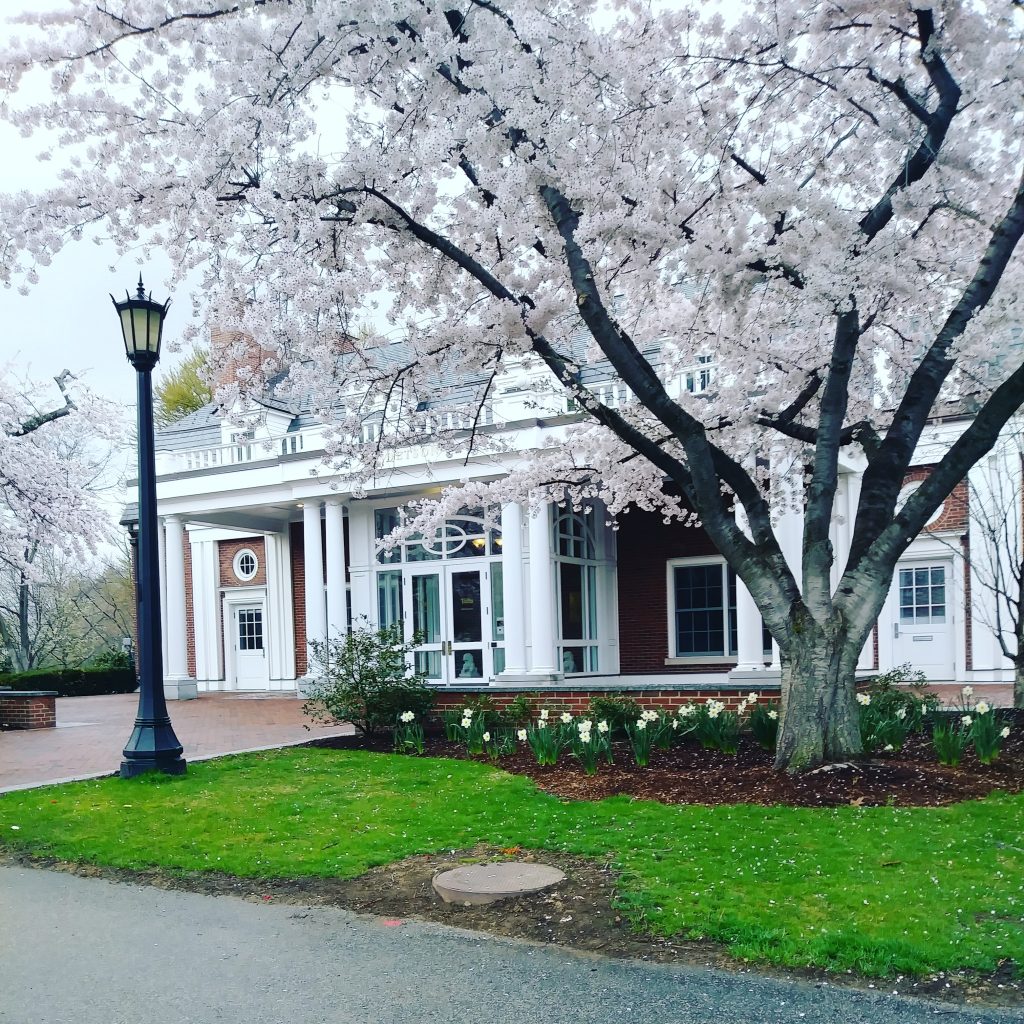
A cherry blossom tree in full bloom outside of the admissions office
Written by Alia Wulff, Cognitive Psychology Ph.D. Candidate
Writing a post on the best things I learned my first year of graduate school was a seemingly insurmountable task. Boiling down nine months of hard work, constant research, and new experiences into a few paragraphs is daunting. I finally narrowed it down to these, my biggest takeaways. These have helped me through the amazing days and the not-so-amazing days.
1) Classes are important, but only if they are useful to your interests.
I have determined that the best process of selecting classes is to separate them into two categories: intriguing and pertinent to your area of study. Then you simply sign up for classes that fall into both categories. This way, you are much more likely to enjoy the classes, while also gaining knowledge that may actually be useful for your future. While it may be tempting to take a class purely because it seems fun, you may regret it later when your knowledge of medieval architecture still hasn’t come in handy and you have to take an extra class to get all of your credits in time. That’s not to say you shouldn’t have fun with classes, just make sure you aren’t being flippant about your choices.
2) Listen to students who are well into graduate school.
They are the most important sources of information in your life, I promise you. These students know crucial information like the closest places to get coffee on campus, which professors teach what classes the best, where the office supplies are located, and when buildings are locked for the night. You may receive a small packet of information from the administration when you first arrive that describes basic things like how to register for classes, but nothing compares to the advice from higher level graduate students. Don’t be afraid to ask them questions. It’s better to ask and feel ridiculous about it than blunder around looking for something that has a simple solution.
3) Make sure you take consistent breaks.
This is so important. This does not mean deciding to take a break when you feel like it, because occasionally you will not feel like taking a break and suddenly it’s dark outside, you haven’t moved from your computer in seven hours, and stretching causes your joints to make horrible noises. Taking consistent breaks means making a conscious effort to remember to stand up and move around at least once every two or three hours. While it may feel like you are disrupting your productivity, you are actually helping your brain function properly by improving blood flow. This advice could also be phrased as “make sure you exercise enough!” but I’m not going to pretend I did that regularly. Taking the few steps to the water fountain to refill my water bottle is often all I have time for, and that’s okay.
4) Taking longer breaks away from the office is also necessary.
For example, I made the decision at the beginning of the year that I would not come into the office on Sundays. I work on my laptop at home and try to be productive, but I do not focus all of my attention on school. This allows me time to focus on other things that often fall to the wayside during the week, such as cleaning my apartment or doing the laundry that somehow always manages to have more clothes in it than I’ve worn. Don’t beat yourself up if you can’t do this regularly but trying to relax is better than not relaxing at all.
5) You have to be kind to yourself.
My final takeaway is the most important thing I have learned. I know that sounds like a terrible motivational poster, but it’s true. It is so easy to receive criticism or a bad grade or a terrible review and hate yourself for it. Graduate students have been told time and time again that we are the best students, the top researchers, the brightest minds and that is why we were accepted into graduate school. Just remember that this is still true, even when you make mistakes. Your worth as an academic is not determined by these small and almost entirely inconsequential problems.
My first year of graduate school, aside from a few papers due at the end of May, was officially over on Friday, May 4th. I completed my last final and gave my last presentation before I headed home for a much-needed weekend of doing absolutely nothing. I was back in my office at 9:00am on Monday. I’ve got participants to run, papers to write, an office to clean, exams to sort, and code to edit. My first year may be finished, but I’ve got four more to get through.
